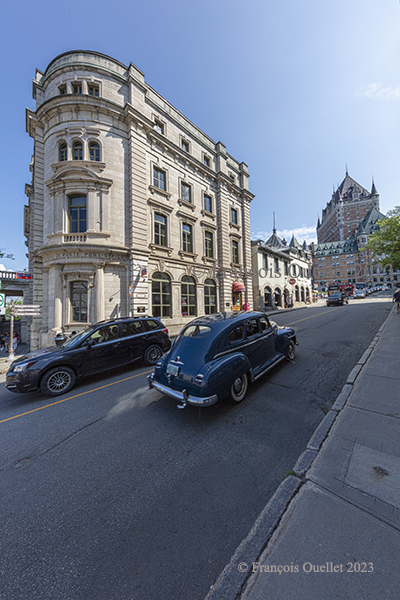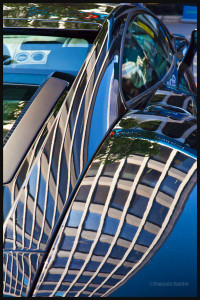
Luck plays a significant role in the acquisition of an original shot. To put chance on our side, we need to go on photo expeditions frequently, whatever the weather, and seize opportunities when they arise.
For this outing in Old Quebec, I thought I’d use a Canon 11–24mm f/4L USM super-wide-angle zoom lens. It allows you to get very close to a tall building and obtain vertical lines without the top of the structure disappearing.
Indeed, many high-performance zooms require the utilization of image-processing software to produce an almost perfect vertical effect. But doing so cuts off the top of the edifice.
So, I was looking for a different perspective to shoot the Château Frontenac. I saw it more in the background, as a point of arrival for the eye, rather than taking up all the space. Even as a small edifice in a photo, you recognize it before any other structure.
To do this, I chose an architecturally interesting building as my starting element. It reminded me vaguely of the Flatiron Building in New York. Naturally, it’s not as high and offers that rounded effect when captured in wide-angle format.
I’ve observed a lot of representations of Old Quebec so far. However, I don’t recall previously noticing the street and the old edifices in this way. Usually, the building in the foreground is partially visible.
Lost in the analysis of the ideal angle, I heard a strange engine sound. On my left, a vintage car was moving slowly and would pass in front of the Canon 5DSr lens in a few seconds.
I quickly lifted the camera and placed it in the right spot. The auto was already gaining speed and I had to seize the opportunity. This vintage car blended perfectly into the scene. Only the slightly more contemporary station wagon indicates a more recent picture.
Modernity and the past still come together in harmony in a developer-protected Old Quebec. To capture interesting pictures, you need to get out into the old town frequently.
Click on the link for more Summer photos of Quebec City and Île d’Orléans on my blog.
